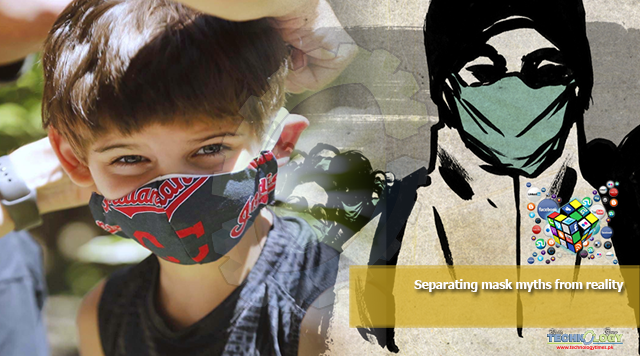As masks make their way into wider usage, so have myths about how they protect and when they should be worn.

By Karen Schiely
According to the Cleveland Clinic, here are basic facts people need to know about masks:
Cloth masks will help protect people from the coronavirus.
The Clinic said it is a myth that wearing a cloth mask is of no use. Homemade cloth face masks are an easy way you can help protect others in your family and the community.
COVID-19 is thought to be spread mainly through droplets that come out of someone’s nose or mouth when they cough, sneeze or talk. Cloth masks act as a physical barrier to keep large droplets from going into the air, where other people can breath them in.
July 1, 2020
The Clinic said studies show that cloth masks reduce the amount of microorganisms someone releases in the air. The more people who wear masks in an area, the fewer potential droplets will be in the air, and there will be less risk of someone being exposed to the virus.
People who are not sick should still wear a mask.
The Clinic said not everyone with the coronavirus gets sick or feels symptoms. These people can unknowingly spread the virus, and this is thought to be a major factor in how the virus spreads so quickly.
Wearing a mask is ultimately about protecting others, and because we don’t know who’s infected for sure, it’s safest for everyone to wear a mask. The Clinic said this contributes to a greater public good.
Wearing a mask does not replace the need to social distance.
The Clinic said masks are one piece of the strategy for preventing the spread of coronavirus. They do not prevent anyone from coughing or sneezing on you, and they may not prevent you from getting sick.
It’s still important to follow all the recommended steps to protect yourself, including practicing proper social distancing, not gathering in large groups and frequent hand washing.
Your mask needs to cover your mouth and nose.
In order for the mask to work properly, it has to cover your nose and mouth.
The Clinic recommends that masks be snug but comfortable against the sides of your face, and you should be able to breathe without restriction. It should also secure around your ears with ties or loops.
Wearing a mask under your chin or neck, or over your head, doesn’t protect anyone.
Wearing a mask will not make you sick from carbon dioxide.
The Cleveland Clinic said there’s been speculation on social media that wearing a mask can cause you to rebreathe exhaled carbon dioxide and make you sick.
The hospital said this is unlikely to happen from wearing a cloth face mask — especially if only worn for short periods of time.
Who shouldn’t wear a mask?
The Cleveland Clinic said some people shouldn’t wear cloth masks. Children under 2, or anyone who has trouble breathing who can’t take the mask off without assistance, shouldn’t wear one.
Originally published at Akron Beacon Journal